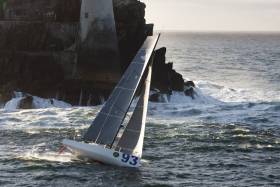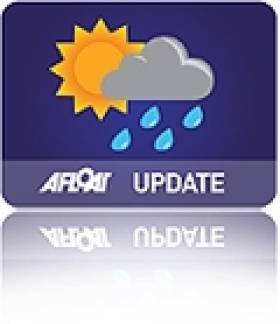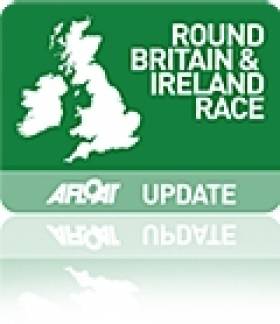Displaying items by tag: forecast
Irish Open Off Because of Poor Weather Forecast
#Rowing: The Irish Open, scheduled for this weekend has been cancelled. The forecast was not good and the organisers decided not to continue with the event. The official announcement said that “in the interest of safety and fairness” Rowing Ireland had cancelled the event.
'Tough & Challenging Round Ireland Race Ahead', Says Sailing Forecaster Mike Broughton
Specialist sailing weather forecaster Mike Broughton of winningwind.com says tomorrow's Round Ireland Race will be a tough and challenging one
‘Looks like we have light sea breezes for the start in fine and sunny conditions – but it’s all going to change.
For start time we have a ridge of high pressure over Wicklow bringing a light sea breeze that will veer to south westerly winds increasing 12-17 knots by early evening, giving a beat south towards Tuskar Rock. Then we have unsettled conditions from midnight as the first of possibly seven fronts to pass the fleet over the next four days. The first warm front will bring light rain and SW winds of 9-15 knots – still giving a beat along the south coast.
By Sunday afternoon, we have a complex, mid Atlantic low pressure system that will dominate the weather from Sunday to Tuesday, bringing several fronts, with rain and winds to gale force mainly from the south west to west-south-west. It looks like a tough and challenging beat on Sunday afternoon/evening around the Fastnet area, particularly for the smaller boats. We can expect winds to 40 knots and seas 3.5 to 4.0 metres.
The low pressure looks to deepen through Sunday and by midnight is forecast to be 300 miles south of Iceland and will then start to slowly fill. Leaving most of the fleet in WSW winds along the west coast on Monday morning, giving fast reaching conditions north, still in waves around 3.5 metres. Winds for Monday afternoon to Tuesday evening still look to be strong (mainly 24-34 knots) from the WSW and giving fast broad reaching conditions across the north coast. Whilst winds on the NE coast will be lighter in the lee of the mainland. Winds east of Dublin will be down to 10 knots by Thursday – mainly from WSW to SW.
Overall, it looks like a tough and challenging race, with plenty of opportunities to make gains from the predictable shifts from passing fronts. Rough seas close to the Fastnet and all along the west coast.
Best of luck to my many friends out there doing the race – it will be one to remember!
Emergency Salt Shipments Supplies Due To Arrive
Two vessels, the CSL Prospect and Olivia are heading for the Port of Cork with a combined cargo of 11,500 tonnes of salt. In the meantime councils are coping with rapidly dwindling supplies to keep the main roads gritted over the weekend. If the councils fail to ration supplies, the authorities will quickly run out of salt, sparking a crisis for motorists. For more on this story click here.
The Port of Cork added that these salt-shipments will continue beyond next week. In addition to next weeks delivery, more vessels will be calling to the port, bringing in total 35,000 tonnes of salt over the next few weeks.
According to weather forecasts, there will be significant accumulations of snow expected in most parts of the country. Up to 10cm of snow may fall over the next few days. For information on the latest weather updates logon to www.met.ie/forecasts/
Bad Forecast Forces Organisers to Change Direction of Race
At last night's Skipper's Briefing for the Sevenstar Round Britain and Ireland Race, the Royal Ocean Racing Club (RORC) announced a dramatic change to the race. Part of the reason for the change is being blamed on a lack of shelter for boats in trouble on the Irish West coast. There are no Irish entries in this year's race.
Due to a severe weather forecast for the west coast of Ireland for Thursday 26th August, the RORC have decided to reverse the course so that the fleet will race anti-clockwise around Britain and Ireland. The start remains unchanged from the Royal Yacht Squadron line to the east at 14.00. This should give the fleet a fast running start towards the forts in the Solent.
Andrew McIrvine, Commodore of the Royal Ocean Racing Club explains why the club took the decision:
"The reason for changing the course is consideration for all the competitors. We have been monitoring the weather models for the last few days and they are all in agreement that a deep depression will be arriving to the west of Ireland at the same time as most of the fleet will be there. The RORC weather advisor Mike Broughton, believes that this will bring wind speeds of at least 40 knots, possibly as much as 50 knots on the nose. Worse than that, as the wind direction changes over 180º as the low passes through the sea state becomes very confused. Although the boats are very well prepared, these conditions could cause damage and retirements and the west coast of Ireland has very few places offering shelter. By going east about, the boats will avoid the worst of the depression and the confused sea state and will have far more shelter opportunities as there will be several ports that the boats can go into should they decide to do so."
The Sevenstar Round Britain and Ireland Race starts tomorrow at 1400 from the Royal Yacht Squadron Line, Cowes, Isle of Wight, England.
For more information and to follow the fleet via the race trackers go to: http://sevenstar.rorc.org/



























































